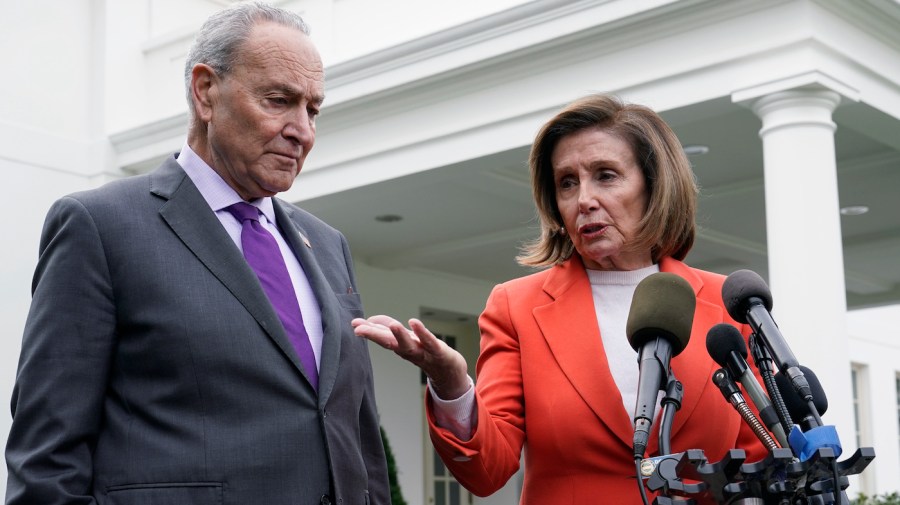
For the better part of two years, Democrats told voters that their country was on the precipice of disaster. Winning in November was imperative, party leaders insisted. Failure would bring catastrophe, not only for America’s democratic institutions but for the economy and working-class people as well.
In normal circumstances, a party that fell short of preventing a crisis like that would be expected to engage in real introspection about what went wrong. Leadership changes would be expected. Like Republicans in the aftermath of 1960 or even 2008, the party would radically re-evaluate the decisions that led to this moment.
Not so in this Democratic Party, where long-time leaders are trudging forward as if nothing happened. From former Harris campaign staffers dissociating in the press to Capitol Hill leadership elections that reject even the premise that anything should change, Democrats are choosing to close their eyes to structural problems at the top of their party. Accountability, it seems, is for other people.
That won’t fix anything.
Recent media interviews reveal party elites who see themselves more as passive observers than as the Democratic Party’s change agents. That’s hardly reassuring to voters who are depending on Democrats to get it together and mount a focused campaign to take back Congress in 2026.
On Monday, Kamala Harris deputy campaign manager Rob Flaherty lamented to Semafor that Democrats were “losing hold of culture.” In other words, Democrats had no response to Donald Trump’s nonstop digital and alternative media blitz — especially his appearance on Joe Rogan’s hugely influential podcast. Flaherty acknowledged that “the institutions by which Democrats have historically had the ability to influence culture are losing relevance.” So long, cable news.
But as Harris’s digital guru, shouldn’t Flaherty have acted on these insights during the campaign? The men and women at the top of the VP’s doomed campaign understood that Trump was making inroads into the Democratic coalition by leveraging YouTube influencers like Theo Von and podcasters like Rogan. Yet they deliver their post-mortem explanations for Harris’s inaction in the passive voice, as if they were not the decision-makers in the room.
I’m not trying to beat up on Flaherty personally. He seems like a thoughtful and introspective guy, and arguably more influential advisers like Jennifer Palmieri also seemed inert in the moment. And at least Flaherty and Palmieri seem self-aware; the same can’t be said for Democrats’ elected leaders, who have largely brushed off any sense of responsibility for the party’s failed efforts to hold the House and Senate. The last few weeks have offered plenty of examples of how divorced Washington reality is from that of the angry voters they serve.
The same Democrats who oversaw last month’s bruising electoral loss have not only returned to their leadership positions, they are more firmly embedded than ever. Just ask Sen. Chuck Schumer, who was unanimously (!) reelected to his role as Democratic leader despite helping author a Senate campaign strategy that cost his party the majority. Or don’t ask him: Schumer has so far avoided answering any tough questions from the press about what went wrong, what he’s learned or what he plans to change going forward.
Things aren’t much better in the House, where Nancy Pelosi and the Democratic Old Guard is leading the charge to stop the next generation of party lawmakers from claiming committee leadership roles. That’s most visible in the battle to become the Oversight Committee’s ranking Democrat, which spilled out into the open after Pelosi began organizing votes against Rep. Alexandria Ocasio-Cortez. Ocasio-Cortez, 35, lost on Tuesday against 74-year-old Gerry Connolly, by a vote of 131-84.
The result has been yet another schism between the base and the elites, with rank-and-file voters left to wonder why the party’s most visible young voices are once again being kicked to the side in favor of the same crop of stalwart septuagenarians. Democrats’ status quo leadership elections would be understandable for a party that outperformed expectations. But this is a party that just lost the White House, the Senate and blew a real opportunity to reclaim the House.
Instead of listening to demoralized and frustrated Democratic voters, the party elders chose to protect leadership that has lost the confidence of the people. If the party has learned a lesson from the debacle of Nov. 5, it sure isn’t acting like it.
Last month’s elections proved that voters aren’t willing to wait around while Democrats get the message that it’s time for a change. The sooner Democrats realize that, the better for the party — and our democracy.
Max Burns is a veteran Democratic strategist and founder of Third Degree Strategies.












